-

新人教版高中英语必修2Unit 3 The Internet-Listening &Speaking&Talking教案二
From the pictures in the text and the title--- choose the best app, we can know that this part is about how to save money by using apps.Step 2 While-listening1. Laura and Xiao Bo are talking about apps. Listen to their conversation and find out what apps they want.Xiao Bo is looking for a(n) exercise app to help him get in shape.Laura would like an app for getting rich and another that will make her grades better.2. Listen again. Are the sentences true T or false F?1). Both of Xiao Bo's apps keep track of the steps he takes._____2). Xiao Bo's second app can help him make a fitness plan._____3). Laura needs an app that will help her get discounts.______4). Laura needs an app that will add money to her bank account._______F T F T3. Listen once more and tick the sentence you hear. Underline the words used to express predictions, guesses, and beliefs.Predictions, Guesses, and Beliefs________It might help me walk more.________My guess is that it wouldn't work.________I imagine this app would help me get fit faster________I suppose that would be good.________I guess you could save a little with this app.________I suppose there would be some problems, too.________I believe this app could help me get thinner.

新人教版高中英语必修2Unit 3 The Internet-Reading and Thinking教案二
Q5:What's Jan's next goal?Her next goal is to start a charity website to raise money for children in poor countries.Q6:What can we learn from her experiences?We learn that when we go through tough times, we can find help and support from other people online. We learn that we can feel less lonelyStep 5: While reading---rethinkingQ1: What is Jan’s attitude to the Internet ?Thankful/Grateful, because it has changed her and her life.Q2: What writing skills is used in the article ?Examples(Jan’s example, the 59-year-old man’s and the 61-year-old woman’s example)Q3: Can you get the main idea of the article ?The Internet has changed Jan’s life/Jan’s life has been changed by the Internet.Step 6 Post reading---Retell the storyMuch has been written about the wonders of the World Wide Web. There are countless articles (1)telling(tell) us how the Internet has made our lives more convenient. But the Internet has done a lot (2)more(much) for people than simply make life more convenient. People’s lives (3) have been changed(change) by online communities and social networks so far. Take Jan for example, who developed a serious illness that made her (4)stuck(stick) at home with only her computer to keep (5)her(she) company. She joined an online group (6)where she could share problems, support and advice with others. She considered the ability to remove the distance between people as one of the greatest (7)benefits(benefit). She was so inspired (8)that she started an IT club in which many people have been helped. She has started to learn more about how to use the Internet to make society better. Her next goal is to start a charity website to raise money (9)for children in poor countries. Jan’s life has been (10)greatly(great) improved by the Internet.

新人教版高中英语必修2Unit 3 The Internet-Reading and Thinking教案一
Paragraph 3. Jan decided to start an IT club to teach old people how to use computers and the Internet. Paragraph 4. Jan has started taking online classes to learn more about how to use the Internet to make society better. Paragraph 5. Jan’s life has been greatly improved by the Internet. Step 5: Critical thinking:(1)How do you arrange your time spent on study and the Internet? Is it reasonable? I usually surf the Internet using my mobile phone for only an hour after class, and it is reasonable for me.(2)What are your online activities? Are they safe? I chat with my friends, read news and play games. I never give away my private information so I think they are safe.Step 4: summary Much has been written about the wonders of the World Wide Web. There are countless articles (1)______(tell) us how the Internet has made our lives more convenient. But the Internet has done a lot (2)_____(much) for people than simply make life more convenient. People’s lives (3) _________________(change) by online communities and social networks so far. Take Jan for example, who developed a serious illness that made her (4)_____(stick) at home with only her computer to keep (5)___(she) company. She joined an online group (6)______ she could share problems, support and advice with others. She considered the ability to remove the distance between people as one of the greatest (7)_______(benefit). She was so inspired (8)____ she started an IT club in which many people have been helped. She has started to learn more about how to use the Internet to make society better. Her next goal is to start a charity website to raise money (9)___ children in poor countries. Jan’s life has been (10)______(great) improved by the Internet. Step 5 Homework:Review what we have learned and find out the key language points in the text.

新人教版高中英语必修2Unit 3 The Internet-Reading for Writing教案二
8. However, the more polite you are, the less likely it is you will be attacked. 然而, 你越有礼貌, 你被攻击的可能性就越小。 Step 8 Writing---the articleHow to stay safe in the online chat roomToday I thought I’d blog about a question that has been asked many times--- how do you stay safe online and avoid bad experiences in the online chat room ? I’m not an expert, but many years as a blogger have taught me a thing or two.First of all, there’s the golden rule of the Internet: keep out of what makes you uneasy. Don’t post comments or click on anything. Second, protect your privacy. Don’t give out too much private information like your address, phone numbers, the ID numbers, etc. Third, be polite. If you are polite to others on the Internet, you won’t be attacked in normal situation. Finally, don’t believe in others easily and never meet someone you met online alone. It is very dangerous.Have you had any bad experiences online, or do you have some good advice for staying safe? Post your comments below!Step 9 Pair workExchange drafts with a partner. Use this checklist to help your partner revise his/her draft.1. Does the writer tell the reader what he/she know about the topic ?2. Are the tips and suggestions well organised ?3. Has the writer defined the new words ?4. Does the author include examples, comparison, or explanations ?5. Does the writer end by asking readers to leave comments and/or suggestions ?6. Can you find any grammar or spelling mistakes.Step 6 HomeworkPut up your revised draft in the classroom or read it to your class.

新人教版高中英语必修2Unit 3 The Internet-Reading For Writing教案一
⑦identity theft 身份盗窃⑧chat room 聊天室⑨draft your blog post 起草博客帖子⑩post embarrassing photos 张贴尴尬照片 【话题句式】 1. How do you stay safe online and avoid bad experiences on the Internet? 你如何在网上保持安全, 避免在网上的不良经历? 2. I’m not an expert, but many years as a blogger have taught me a thing or two. 我不是专家, 但作为一个博主, 我已经学了好几年了。 3. If you see or read something that makes you feel uncomfortable, leave the site immediately. 如果你看到或读到一些让你觉得不舒服的东西, 立即离开这个网站。4. Don’t give out your address or phone number. 别告诉别人你的地址或电话号码。 5. Identity theft is a common and serious problem. 身份盗窃是一个常见而严重的问题。6. Being online is no excuse for being rude, and you don’t want to become a target for a troll or cyberbully. 上网并不是无礼的借口, 你也不想成为发挑衅帖子的人或网络恶霸的目标。 7. Trolls often use several false names so that they can stay on a site. 发挑衅帖子的人经常使用几个假名, 这样他们就可以留在一个网站上。8. However, the more polite you are, the less likely it is you will be attacked. 然而, 你越有礼貌, 你被攻击的可能性就越小。
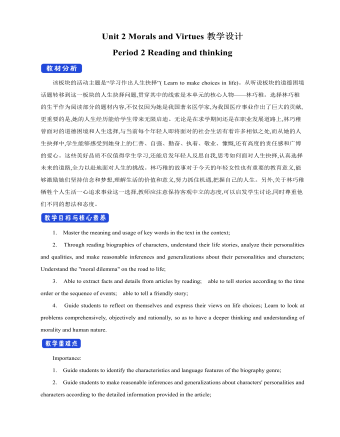
新人教版高中英语必修3Unit 2 Morals and Virtues教学设计二
Activity 41. Students complete the task of activity 4, then teachers and students check the answers. 2. The teacher organized the students to work together and asked them to use the tables and mind maps sorted out before to retold the important choices in Lin Qiaozhi's life and their resultsStep 5 Language points1. The teacher asks the students to read the text carefully, find out the core words and long and difficult sentences in the text and draw lines, understand the use of vocabulary, and analyze the structure of long and difficult sentences. 2. The teacher explains and summarizes the usage of core vocabulary and asks the students to take notes. 3. The teacher analyzes and explains the long and difficult sentences that the students don't understand, so that the students can understand them better. Step 6 Homework1. Read the text again, in-depth understanding of the text; 2. Master the use of core vocabulary and understand the long and difficult sentences. 3. Complete relevant exercises in the guide plan. 1、通过本节内容学习,学生是否理解和掌握阅读文本中的新词汇的意义与用法;2、通过本节内容学习,学生能否结合文本特点总结林巧稚的人生原则和人格品质特征;3、通过本节内容学习,学生能否针对人生抉择发表自己的看法;能否全面地、客观地、理性地看待问题,进而对道德和人性有更加深入的思考和理解。
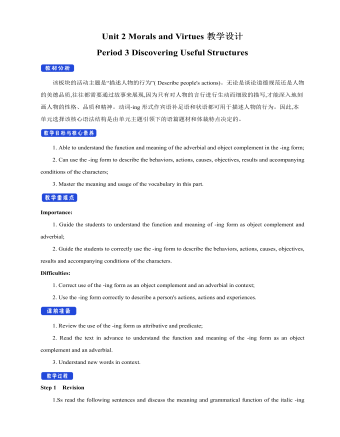
新人教版高中英语必修3Unit 2 Morals and Virtues教学设计三
The joke set her crying.这个玩笑使她哭起来。Step 5 ReadingActivity 31. Students read the small text in activity 3. The teacher provides several small questions to check whether students understand the content of the text and the ideographic function of the -ing form in the text.*Where are those people?*Why did Dr Bethune come to China?*How did he help the Chinese people during the war?*What did Chairman Mao Zedong say about him?2. Ss try to rewrite some sentences using the -ing form. Then check the answers. When checking the answers, the teacher can ask different students to read the rewritten sentences and give comments.Answers:1. he became very interested in medicine, deciding to become a doctor.2. …after hearing that many people were dying in the war.3. Helping to organise hospitals, he taught doctors and nurses, and showed people how to give first aid./ He helped to organise hospitals, teaching doctors and nurses, and showing people how to give first aid.4. …praising Dr Bethune as a hero to be remembered in China.Step 6 PracticeActivity 4Students complete grammar activities 2 and 3 on page 69 of the workbook.Step 6 Homework1. Understand and master the functions and usage of the -ing form;2. Finish the other exercises in Using structures.1、通过本节内容学习,学生是否理解和掌握动词-ing形式作宾语补足语语和状语语的功能和意义;2、通过本节内容学习,学生能否正确使用动词-ing形式描述人物的行为、动作及其经历;3、通过本节内容学习,学生能否独立完成练习册和导学案中的相关练习。
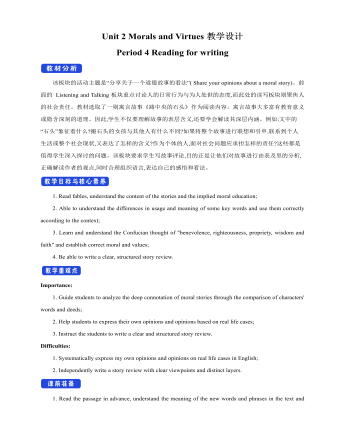
新人教版高中英语必修3Unit 2 Morals and Virtues教学设计四
3.Teachers ask different groups to report the answers to the questions and ask them to try different sentence patterns.The teacher added some sentence patterns for students to refer to when writing.Step 4 Writing taskActivity 51.Write the first draft.Students first review the evaluation criteria in activity 5, and then independently complete the draft according to the outline of activity 4, the answers to the questions listed in the group discussion and report, and the reference sentence pattern.2.Change partners.The teacher guides the students to evaluate their partner's composition according to the checklist of activity 5 and proposes Suggestions for modification.3.Finalize the draft.Based on the peer evaluation, students revise their own compositions and determine the final draft.Finally, through group recommendation, the teacher selects excellent compositions for projection display or reading aloud in class, and gives comments and Suggestions.Step 5 Showing writingActivity 5T call some Ss to share their writing.Step 6 Homework1. Read the passage in this section to better understand the passage.2. Carefully understand the hierarchical structure of the article, and deeply understand the plot of the story according to the causes, process and results;3. Independently complete the relevant exercises in the guide plan.1、通过本节内容学习,学生是否理解和掌握阅读文本中的新词汇的意义与用法;2、通过本节内容学习,学生能否通过人物言行的对比分析道德故事的深层内涵;3、通过本节内容学习,学生能否根据故事的起因、经过和结果来深入理解故事的情节,从而了解文章的层次结构;4、结合现实生活案例发表自己的见解和看法,写一篇观点明确、层次分明的故事评论。
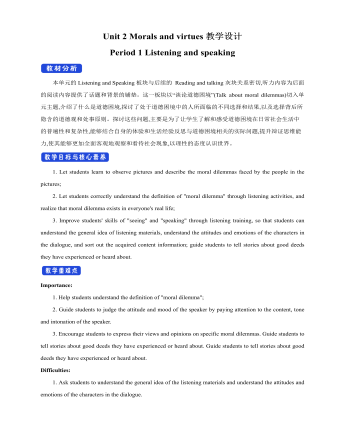
新人教版高中英语必修3Unit 2 Morals and virtues教学设计一
(2) students are divided into groups according to the requirements of activity 3. Each student shares a story of personal experience or hearing-witnessing kindness, and then selects the most touching story in the group and shares it with the whole class. Before the students share the story, the teacher can instruct them to use the words and sentence patterns in the box to express. For example, the words in the box can be classified:Time order: first of all, then, after that, later, finally logical relationship :so, however, although, butTeachers can also appropriately add some transitional language to enrich students' expression:Afterwards, afterwards, at last, in the end, eventuallySpatial order: next to, far from, on the left, in front ofOtherwise, nevertheless, as a result, therefore, furthermore, in addition, as well asSummary: in a word, in short, on the whole, to sum up, in briefStep 8 Homework1. Understand the definition of "moral dilemma" and establish a correct moral view;2. Accumulate vocabulary about attitudes and emotions in listening texts and use them to express your own views;3. Complete relevant exercises in the guide plan.1、通过本节内容学习,学生能否理解理解“道德困境”的定义;2、通过本节内容学习,学生能否通过说话人所表达的内容、说话的语气、语调等来判断其态度和情绪;3、通过本节内容学习,学生能否针对具体的道德困境发表自己的看法和见解,能否掌握听力理训练中的听力策略。
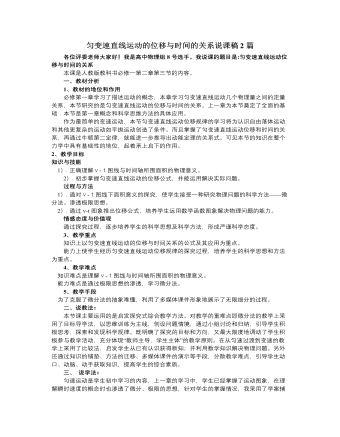
人教版新课标高中物理必修1匀变速直线运动的位移与时间的关系说课稿2篇
培养学生合作交流意识和探究问题的能力,这一部分知识层层递进,符合学生由特殊到一般、由简单到复杂的认知规律。4、互动探究(1)极限思想的渗透让学生阅读“思考与讨论”小版块.培养学生的自学和阅读能力提出下列问题,进行分组讨论:a、用课本上的方法估算位移,其结果比实际位移大还是小?为什么?b、为了提高估算的精确度,时间间隔小些好还是大些好?为什么?针对学生回答的多种可能性加以评价和进一步指导。让学生从讨论的结果中归纳得出:△t越小,对位移的估算就越精确。渗透极限的思想。通过小组内分工合作,讨论交流,培养学生交流合作的精神,以及搜集信息、处理信息的能力;通过小组间对比总结,使学生学会在对比中发现问题,在解决问题过程中提高个人能力;
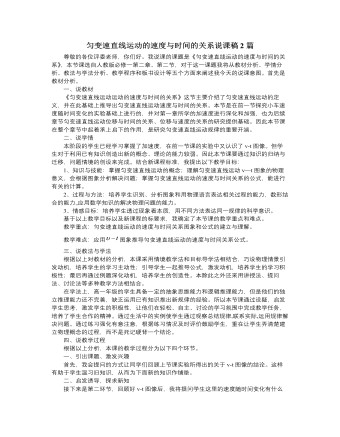
人教版新课标高中物理必修1匀变速直线运动的速度与时间的关系说课稿2篇
设计意图:几道例题及练习题,其中例1小车由静止启动开始行驶,以加速度 做匀加速运动,求2s后的速度大小?进而变式到:小车遇到红灯刹车……,充分体现了“从生活到物理,从物理到社会”的物理教学理念;例题及练习题由浅入深、由易到难、各有侧重,体现新课标提出的让不同的学生在物理上得到不同发展的教学理念。这一环节总的设计意图是反馈教学,内化知识。(6) 小结归纳,拓展深化我的理解是,小结归纳不应该仅仅是知识的简单罗列,而应该是优化认知结构,完善知识体系的一种有效手段,为充分发挥学生的主题作用,从学习的知识、方法、体验是那个方面进行归纳,我设计了这么三个问题:① 通过本节课的学习,你学会了哪些知识;② 通过本节课的学习,你最大的体验是什么;③ 通过本节课的学习,你掌握了哪些学习物理的方法?

人教版高中语文必修3《高老头》教案
4、问题讨论(1)巴尔扎克小说在法国文学史上的地位?在法国文学史的地位:随着巴尔扎克在法国文坛上的如日中天,他渐渐地被他的时代的作家所认识。戈蒂耶第一个站出来热情地赞扬巴尔扎克的天才。此后乔治·桑、波德莱尔、福楼拜、左拉对他赞誉有加。雨果甚至在巴尔扎克的葬礼上说:“在最伟大的人物中间,巴尔扎克属于头等的一个,在最优秀的人物中间,巴尔扎克是出类拔萃的一个。他的才智是惊人的,不同凡响的成就,不是眼下说的尽的……”人道主义斗士法朗士对文体非常苛求,他深请地说:“他是他那个时代的社会的洞察入微的历史家。他比任何人都善于使我们更好地了解从旧制度想新制度的过度。”特别强调:“从塑造形象和深度来说,没有人能比得上巴尔扎克。”后来的作家莫洛业说:“巴尔扎克不仅仅是十九世纪的优秀作家,他堪称最伟大的小说家,这在今天几乎是一致的看法。”

人教版高中语文必修3《琵琶行 并序》教案
9、在乐曲终了之后,诗人以“东船西舫悄无言,唯见江心秋月白”两句结尾,这两句作用如何?明确:诗人没有直接写听者的热烈反响以说明琵琶女技艺非凡和乐声的感人至深,否则过于直白就不含蓄,不含蓄也就显不出深沉了。用“东船西舫悄无言”的寂静无声,反衬“有声”的音乐效果,可谓“此时无声胜有声”了。人们无声地沉浸、陶醉在艺术的享受之中,那深深打动人的乐声仿佛缭绕迂回耳际,不由得使诗人想到了自己浩茫的心事,引起情绪上的波澜。在这片刻的沉寂中,只见一轮迷蒙的冷月荡漾在江心的微波之中,它提醒诗人从乐声中回到现实中来。这句景物描写点染烘托了浓重的氛围,与复杂的乐声融为一体,共同表现了琵琶女与诗人息息相通的复杂情感,是那么的忧愤、哀怨凄楚、苍凉,给整个音乐形象补足了画龙点睛之笔。
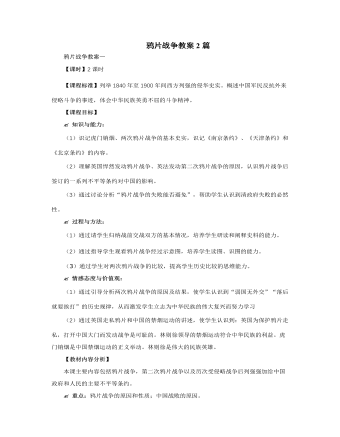
人教版高中历史必修1鸦片战争教案2篇
1.知识与能力:(1)通过引导学生分析鉴赏19世纪以来有代表性的音乐与美术作品,了解这些作品产生的时代背景及其艺术价值。(2)通过分析世界艺术产生的历史背景,可以帮助学生正确认识人类文化的多样性、时代性和民族性,培养学生结合历史背景分析历史问题的能力。(3)通过对19世纪以来的音乐与美术史实的分析、综合、比较、归纳、概括等认知活动,培养历史思维和解决问题的能力。2.过程与方法:(1)让学生在搜集资料、自主探究、合作交流过程中,发展学生在社会中学习、网络学习、终身学习的能力。(2)通过上网了解艺术大师及分析鉴赏其各类美术、音乐作品,感受其艺术价值。 (3)思维方法:学会知识迁移,在从感知历史到不断积累历史知识,进而不断加深对历史和现实的理解过程中,提高分析理解问题能力。学会善于从不同的角度发现问题,积极探索解决问题的方法,从而做到论从史出、史论结合。
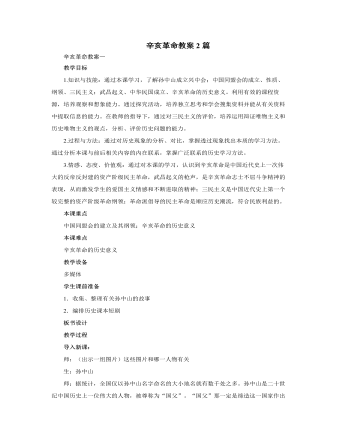
人教版高中历史必修1辛亥革命教案2篇
①从政府人员组成看,南京政府是一个以资产阶级革命派为主体的政府。②从政府颁发的法令和措施看,这些法令体现了资产阶级民主革命的要求,对于发展民族资本主义经济、资产阶级民主政治和文化教育以及改革社会风气,都起了积极作用。③从颁布的《中华民国临时约法》看,宪法体现了三权分立的政治体制,体现了资产阶级民主主义的要求,是中国历史上第一部资产阶级民主宪法,具有反封建专制制度的进步意义。(2)从南京临时政府的内外政策分析南京政府的根本弱点①未彻底地反封建。它没有采取比较彻底的反对封建主义的措施,特别是对封建统治的基础——地主阶级土地所有制没有触动,这样,南京临时政府也就不能真正地把广大人民群众动员起来,因而缺乏真正的群众基础。
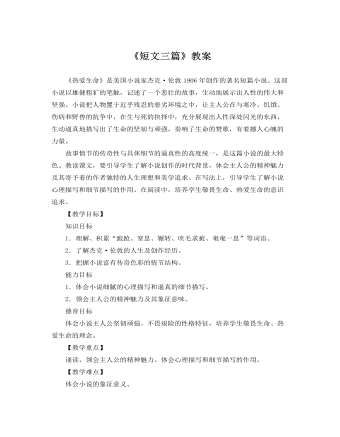
人教版高中语文必修4《短文三篇》教案
③于是,大自然出现了惊人的奇迹,不毛的石缝间丛生出倔强的生命。④或者就只是一簇一簇无名的野草,春绿秋黄。岁岁枯荣。它们只有三两片长长的细瘦的薄叶,那细微的叶脉,告知你生存该是多么艰难;更有的。它们就在一簇一簇瘦叶下自己生长出根须,只为了少向母体吮吸一点乳汁,便自去寻找那不易被觉察到的石缝。这就是生命,如果这是一种本能,那么它正说明生命的本能是多么尊贵,生命有权自认为辉煌壮丽,生机竟是这样地不可扼制。⑤或者就是一团一团小小的山花,大多又都是那苦苦的蒲公英。它们不似田野上的同宗长得那样茁壮,它们的茎显得坚韧而苍老。它们的叶因枯萎而失却光泽。它们已经不能再去为人们作佐餐的鲜嫩的野菜,却默默地为攀登山路的人准备了一个可靠的抓手。生命就这样地被环境规定着,又被环境改变着,适者生存的规律尽管无情。但一切适者就是战胜环境的强者。生命现象告诉你,生命就是拼搏。
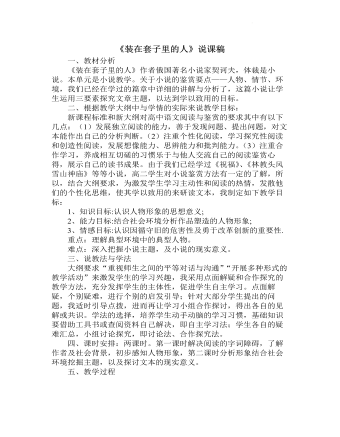
《装在套子里的人》说课稿 2021-2022学年统编版高中语文必修下册
8、板书装在套子里的人别里科夫的形象——有形的套子套己——无形的套子套人第二课时合作探究:目标挖掘主题及现实意义。问题设置,衔接上节课内容,层层深入。1、结合上节课别里科夫的形象分析:他的思想被什么套住,其悲剧原因在哪?(根据人物形象的分析与社会背景的了解,直击主题。)沙皇腐朽的专制统治套住了他的思想,沙皇的清规戒律使他不敢越雷池一步,所以他是受害者,但他的身份性格以及特定的社会环境,又让他成为沙皇统治的捍卫者。2、他恋爱的情节以及科瓦连科这两个人物的塑造的意义?(从人物以及主题入手,推翻沙皇的腐朽反动的统治,必须是每一个人都敢于打破套子,唤醒革新,更新观念,拒绝腐朽。)别里科夫渴望打破束缚,也想革新,而科瓦连科两个人物体现朝气活泼,以及勇于打破常规束缚的勇气,为革新升起了一片曙光。3、塑造别里科夫的手法,除了一般刻画人物方法外,还有什么方法?
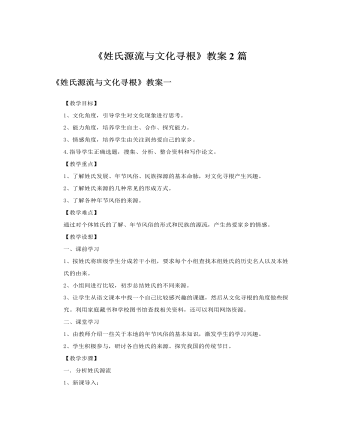
人教版高中语文必修2《姓氏源流与文化寻根》教案2篇
据此,研究者认为我国的姓源于原始社会母系氏族时期,并作为一个血缘家族的称号。氏隶属于姓。夏、商、周时期,姓氏作为贵族间区别不同血缘关系的一种制度。自秦汉以后,姓氏不分,合二而一。3、大家有没有听说过《水浒传》中一个人物“西门庆”,他姓西门,为什么姓西门呢?他家住在西门这个地方。大家想想东郭先生为何姓东郭?可见有按居住地而得姓。4、现在如果赋予同学们一个神圣的职责,让你们给一个人赐姓,这个人是杀猪杀鸡杀鸭的,你们觉得要给他一个什么样的姓才合适呢?(自由讨论,姓“屠”)明确:这就是姓氏来源的又一种方法,按照职业取姓。大家想一想有没有其他按照职业得姓的姓氏?(巫、卜、陶等)5、大家通过预习有没有发现其他获得姓氏的方法。(国名、自己祖先的字等。)姓在母系氏族社会以后,逐渐增多,来源极广。主要来源于封国名、谥号、爵位名、官名、居地、职业等。
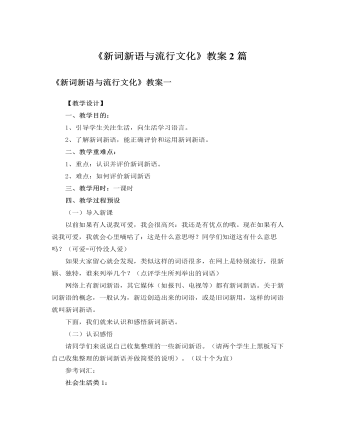
人教版高中语文必修1《新词新语与流行文化》教案2篇
【教学设计】一、教学目的:1、引导学生关注生活,向生活学习语言。2、了解新词新语,能正确评价和运用新词新语。二、教学重难点:1、重点:认识并评价新词新语。2、难点:如何评价新词新语三、教学用时:一课时四、教学过程预设(一)导入新课以前如果有人说我可爱,我会很高兴:我还是有优点的哦。现在如果有人说我可爱,我就会心里嘀咕了:这是什么意思呀?同学们知道这有什么意思吗?(可爱=可怜没人爱)如果大家留心就会发现,类似这样的词语很多,在网上是特别流行,很新颖、独特,谁来列举几个?(点评学生所列举出的词语)网络上有新词新语,其它媒体(如报刊、电视等)都有新词新语。关于新词新语的概念,一般认为,新近创造出来的词语,或是旧词新用,这样的词语就叫新词新语。
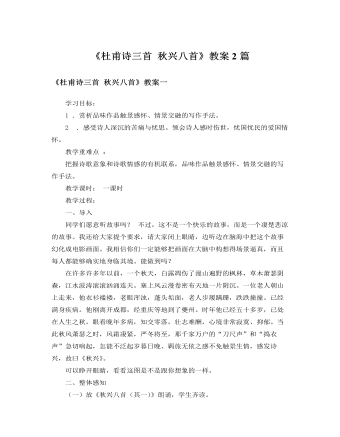
人教版高中语文必修3《杜甫诗三首 秋兴八首》教案2篇
4、主旨 哪一联明确地点明全诗题旨?表达了作者的什么感情?试做分析 颈联。 菊花开在秋天,所以这 “ 丛菊 ” 回应了诗题中那个 “ 秋 ” 字。 “ 他日 ” 可以指过去也可以指未来,在这里是指过去。“丛菊两开”,指诗人于 765 年离开成都,原打算很快出峡,但这年留居云安,次年又留居夔州,见到丛菊开了两次,还未出峡,故对菊掉泪。秋菊两度盛开,使诗人再次洒下往日流过的眼泪。“开”字双关,一谓菊花开,又言泪眼随之开。此时他仍然滞留在他乡,他始终没有放弃回乡的打算。孤舟可以系住,使其不能泛诸中流,但诗人的心是系不住的。他的心早已越过江河,越过关山,飞到了长安。所以,一叶靠岸系绳的孤舟,始终都牵动着诗人的故园之思。这一联是全篇诗意所在。孤舟本来只能系住自己的行踪,却把诗人的思乡之心也牢牢地系住了,故见舟伤心,引出故园之思,表现出思乡之情的深沉浓烈和欲归不得的无奈与凄伤,为文章的主旨句。